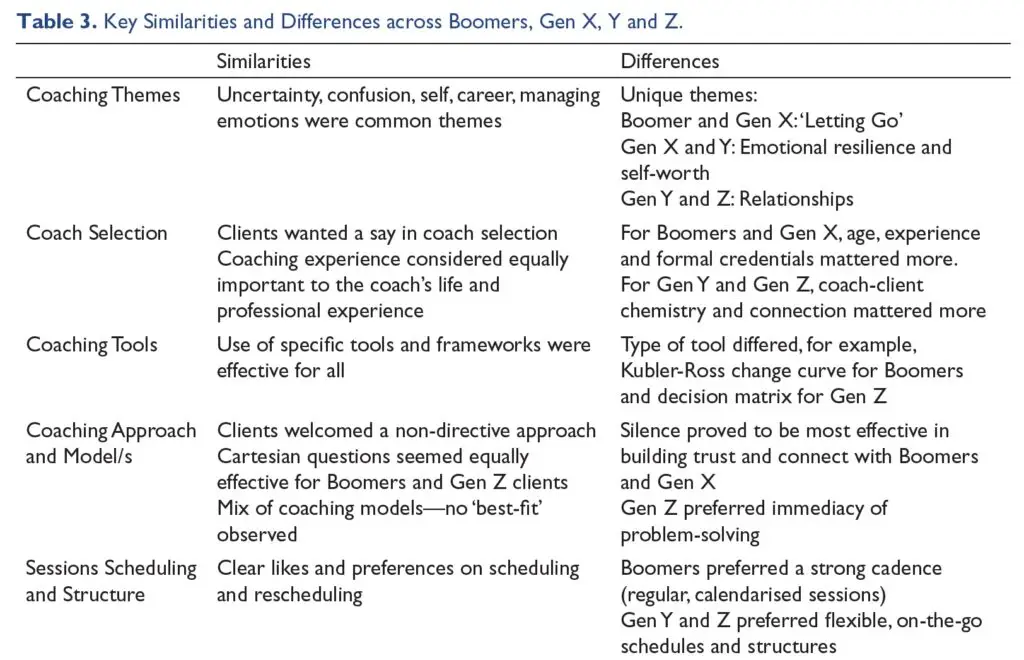Communication, the cornerstone of nurse coaching, is a nuanced art. It becomes more complex when dealing with different generations – Boomers, Generation X, Millennials, and Generation Z – each having their unique communication styles and preferences.
As a nurse coach, understanding these differences and similarities can help you effectively engage with your clients across generations.
Each generation, like a different acrobat act, has its own peculiar quirks, leaps, and somersaults in the way they communicate. And if you’re a nurse coach, understanding these diverse performances can help you tailor your own act, thereby dancing the communication waltz with your clients with the grace of a prima ballerina.
A huge thank you to Board Certified Nurse Coach and INCA’s Nurse Planner/Program Coordinator, Karly Mertz, for her expert assistance with the example script below! 🙌
I decided I’m going to incorporate these little rambling anecdotes into my blog posts. Feel free to collapse the accordion above if you just want the meat and potatoes of the post. And, in case you missed the first edition of my rambles, hop on over to my Emojis and Nurse Coaching post for a refresher course in emoji translation.
Allow me to present a real-life example in the grand theatre of the Integrative Nurse Coach® Academy. Enter my business partner, mentor, and dear friend, Karen Avino, INCA’s Executive Director of Education. We come from different eras, but that’s never been an issue. In fact, it’s like jamming with a jazz band – different instruments, different rhythms, but when brought together, harmony.
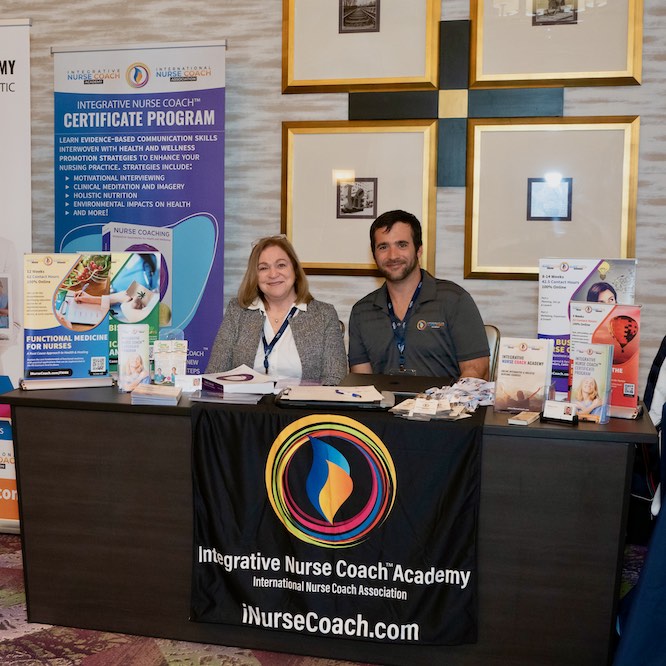
When Karen and I co-founded INCA, our differing generational perspectives became our secret sauce. Our contrasting viewpoints allowed us to blend the wisdom of experience with the vitality of the new age, creating a vibrant tapestry of insights. Karen’s experience-rich pragmatism coupled with my energetic innovation led to a synergistic partnership that is the backbone of INCA’s success.
For this success to happen, it was imperative that we learn each other’s vernacular – otherwise, how could we effectively communicate and run a business?
Our intergenerational banter often adds a dash of humor to our day-to-day interactions. Karen, for example, has a fondness for replying with a monosyllabic “K” to Slack messages. Now, if you’re a millennial like me, you’d probably be gasping, “What did I do wrong? Is she mad at me? Why does the universe exist?”
On the other hand, if you’re from a different generation, you’re likely scratching your head and going, “Um, yeah, and?”
To us, millennials, a solo “K” is a veritable Pandora’s box. It’s akin to hearing the violin screeching music from Psycho (yes, a millennial just referenced a movie from 1960). But does Karen mean to scare me? Absolutely not! I used to wonder if she was mad at me 😂…until we communicated about the situation.
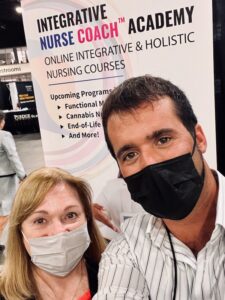
Karen’s mysterious “K” and my millennial panic might seem like an oil/water situation, but it’s actually a testament to our resilience, adaptability, and friendship. Working together, we’ve created an atmosphere where wisdom meets innovation, traditional meets contemporary, and experience meets novelty.
This generational alchemy has given us a more comprehensive understanding of our students (you!) and has enriched our teaching methods, making us relatable to all generations.
Alright, Ron, nice yarn you’ve spun there, but what’s the bottom line?
Multigenerational communication is as everyday as charging your phone, brushing your teeth, or forgetting where you’ve put your glasses. And if you’re a nurse coach, it becomes as important as remembering to wear your pants before leaving the house.
You’ve got to keep your senses keenly attuned to this to ensure you’re hitting the right communication notes that resonate with your client. It’s not about changing the music of your generation (we can’t exactly time travel), it’s about recognizing and appreciating the unique melodies of other generations.
Think of it as being a conductor. You don’t play every instrument in the orchestra, but you understand how each one works and sounds. This way, you can bring them all together to create harmonious symphonies.
Being a nurse coach is similar – you can’t change your own generation, but you can tune into the communication frequency of others.
This keen awareness and adaptability are what will transform you into a virtuoso nurse coach, capable of striking a chord with clients from every generation.
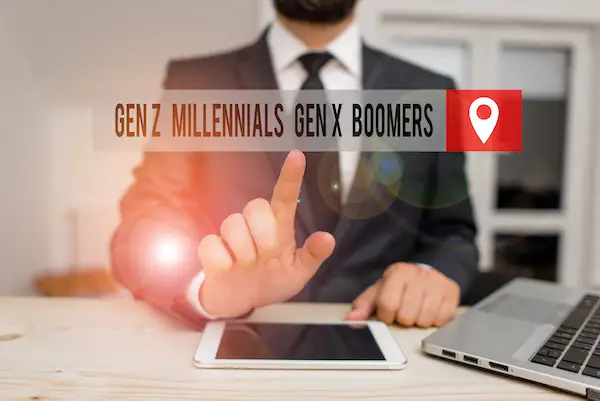
“K” 😉 – let’s dive into some key characteristics of the generations and some suggestions to keep in mind while coaching.
Then, we’ll provide a few examples of how a message can be adapted for different generations.
Finally, though we know nurse coaching is not scripted, we’ll conclude with example scripts of how coaching sessions could go with different clients from different generations. clients.
Baby Boomers (1946-1964)
- Boomers, grew up in a pre-digital age, making them more inclined towards face-to-face and telephone conversations. They value personal interactions and typically prefer direct, formal communication.
- When it comes to written exchanges, Boomers often lean towards emails with a professional tone. They appreciate clear, concise messages that steer clear of slang and abbreviations.
- From a nurse coaching perspective, providing thorough, detailed information, and allowing ample time for discussions can help in effectively communicating with Boomers.
- For instance, as a nurse coach, when communicating with a Boomer about a medical procedure, it’s beneficial to craft an email that’s thorough, detailed, and written in a formal, respectful tone. Allow ample time for a follow-up discussion, either in person or via a phone call.
Generation X (1965-1980)
- Generation X forms a bridge between the digital natives and digital immigrants. Gen Xers are comfortable with digital communication platforms but also appreciate face-to-face interactions.
- Written communication for Gen Xers leans more towards emails, but they are also not averse to using more contemporary platforms like messaging apps. While they appreciate direct, clear messages, they are more accepting of an informal tone compared to Boomers.
- Nurse coaches should maintain clear, straightforward communication while also embracing digital tools when interacting with Gen Xers.
- For instance, a nurse coach might use an email or even a text message to remind a Gen Xer about an upcoming appointment or to give brief instructions about pre-appointment preparations. A relaxed, conversational tone would typically be acceptable and appreciated.
Millennials (1981-1996)
- Millennials, often labeled digital natives, are comfortable with technology. They’re adept at using various communication platforms.
- Though comfortable with emails, they also lean towards quicker, more efficient tools like instant messaging platforms. They appreciate brevity, informality, and the use of emojis for conveying emotions. For example, a nurse coach might send a quick message to a Millennial patient via a healthcare app or platform to confirm a meeting or update on a health status. A casual tone, possibly including an emoji for added clarity or emphasis, would likely be well received.
- As a nurse coach, being open to diverse digital platforms and adopting a friendly, informal tone can help in connecting with Millennials.
Generation Z (1997 and later)
- Gen Z has grown up in a hyper-connected, fast-paced digital world. They prefer quick, frequent, and highly visual communication.
- They gravitate towards speedy, visual platforms such as social media and video chats. In written communication, they often use short text and emojis for fast, expressive communication.
- A nurse coach, for example, could utilize a short, visually engaging video sent through a social media platform to explain a specific health condition or treatment plan to a Gen Z patient.
Putting it all together: A Nurse Coach Perspective
Any common ground between the generations? While the preferences differ, all generations value clear, respectful, and authentic communication. They appreciate being listened to, understood, and taken seriously, irrespective of the medium used.
As a nurse coach, adaptability is crucial in your communication approach to meet the needs of each generation. This involves recognizing and valuing their preferred styles but also educating them about other effective communication methods.
Consider these tips:
- Be flexible in the mediums you use – email, phone, social media, video calls, or messaging apps.
- Adjust your tone and language to match your client’s comfort level.
- Incorporate visual aids or emojis when appropriate to improve comprehension.
- Always maintain clarity in conveying health information.
Understanding multi-generational communication preferences can empower you as a nurse coach to build stronger relationships with your clients.
Remember, effective communication is not just about speaking or writing; it’s about understanding and being understood.
Embrace the challenge of multi-generational communication as an opportunity to enrich your client interactions and enhance your coaching outcomes.
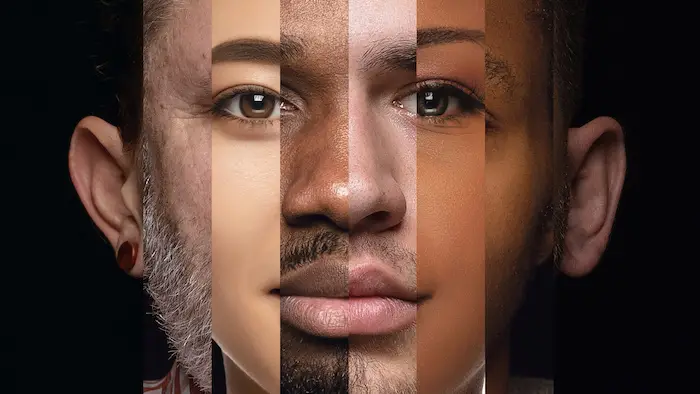
Multi-generational Communication Examples for Nurse Coaches
In your busy nurse coaching practice, you received four different inquiries from potential clients today. Go you! Each inquiry came from a potential client where it sounded like exercise would be beneficial to them. Let’s consider how you could respond to each.
Remember, these are just examples, and actual communication would need to take into account individual personality, preference, and health requirements.
Following up with a Boomer (1946-1964)
The nurse coach may wish to respond to a boomer with a phone call or a face-to-face meeting. They could also respond with a detailed email. Whichever they decide, a typical response could sound like:“Dear [Client’s Name], I hope this email finds you well. I appreciate you reaching out to me. It is clear that you are ready to take charge of your health. It would be beneficial for us to discuss the importance of regular exercise for maintaining optimal health. Regular physical activity can help lower the risk of various health issues, such as heart disease and high blood pressure. It would be beneficial if we could find a routine that suits your preferences and lifestyle. When you have some time, could we schedule a meeting or a phone call to discuss this in more detail? I look forward to hearing from you. Best regards, [Nurse’s Name]”
Following up with Generation X (1965-1980)
The nurse coach might decide to use both face-to-face interaction and digital communication, as Gen X is comfortable with both. An email or even a brief text message would be appropriate:
“Hi [Client’s Name], Thank you for reaching out to me. Let’s chat about integrating exercise into your schedule. It’s great for overall health and can reduce the risk of certain conditions. I’d love to work with you to create a routine that fits your lifestyle. Let’s find a convenient time to discuss more, either in person or via a video call. Let me know what works for you.
Best, [Nurse’s Name]”
Following up with Millennials (1981-1996)
For millennials, a text message or instant message on a health app would be effective. They prefer quicker, more informal communication, often using emojis:
“Hey [Client’s Name] 😊, Thanks for reaching out and hope all is well! Quick note to remind you about the benefits of regular exercise 💪. It’s great for your health and can help prevent a lot of health issues. Let’s find a routine that you’d enjoy. Shoot me a text when you’re free, and we can chat more about it! Cheers, [Nurse’s Name]”
Following up with Generation Z (1997 and later)
Generation Z prefers quick, visual communication. A short, engaging video message sent through a social media platform or health app would be ideal:
“Hey [Client’s Name]! 🌟 Wanted to chat about the magic of regular exercise! 💪 It’s not just about losing weight – it helps you sleep better, feel better, and even concentrate better. 🧠💡 I know you love dancing. 🕺💃 What if we design a workout routine that feels more like a dance party? 🎉 Check out this short TikTok dance workout video I’m sharing below. DM me and we can plan it out! Catch ya later, [Nurse’s Name]”
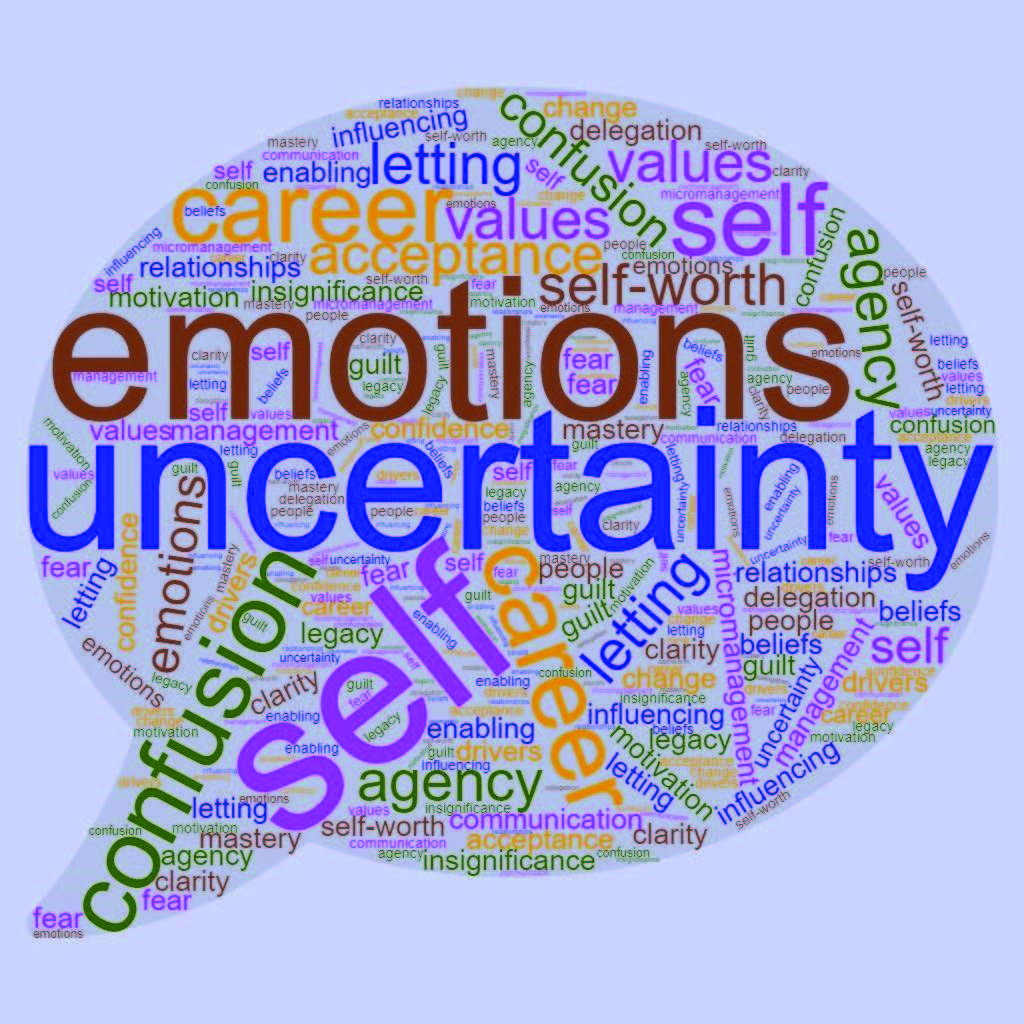
Multi-generational Nurse Coaching Example Scripts
The purpose of presenting these scripts is to illustrate how a nurse coach can tailor their communication style and approach to resonate more effectively with clients across different generations. By doing so, the coach can enhance their understanding, build rapport, and foster better engagement, which can significantly improve coaching outcomes.
Script 1 – Baby Boomers
Nurse Coach: “Good afternoon, Mrs. Jenkins. It’s wonderful to see you again. How have you been since our last meeting?”
Client: “I’ve been okay, thank you. Just trying to keep up with the exercise routine you suggested.”
Nurse Coach: “I appreciate your efforts, Mrs. Jenkins. It’s very important for your health. Now, let’s go a bit deeper. Are there any specific challenges you’re facing with the routine? Perhaps certain exercises or the time of day?”
Client: “Well, I find it hard to maintain consistency, especially when I feel tired or when the weather is not great for a walk outside.”
Nurse Coach: “I understand, Mrs. Jenkins. Adapting to a new routine can be challenging and it’s important to listen to your body. But let’s try to find a solution together. Do you mind if I suggest some indoor exercises that you can do at home? We could also think about activities that you enjoy doing that can serve as a form of exercise, such as dancing or gardening. Furthermore, we can try adjusting the timing of your exercise routine to when you feel most energized during the day. What do you think?”
Client: “That sounds like a good plan. I do like gardening, and perhaps I could do that more regularly.”
Nurse Coach: “Excellent! Gardening can be a great way to stay active. Let’s explore this further and create a plan that suits your preferences and lifestyle.”
Explanation
The nurse coach uses a formal tone, respectful address (Mrs. Jenkins), and provides detailed, thorough suggestions, reflecting the Baby Boomers’ preference for face-to-face, personal interaction. The coach also makes a concerted effort to involve the client in decision-making, demonstrating respect for her autonomy. This respectful, detailed, and direct approach aligns with the Baby Boomer generation’s values and communication style, making it more effective.
Script 2 – Generation X
Nurse Coach: “Hi, Mark. It’s great to see you again. So, how’s the new exercise routine working out for you? Are you finding it beneficial?”
Client: “Hi, it’s going alright, I suppose. But with work and taking care of the family, it’s tough to stick to it consistently.”
Nurse Coach: “I can imagine how tough it can be juggling work, family, and personal care. It’s all about finding a balance, isn’t it? Were there any days that felt more successful than others? If so, what did you notice that was different about that day that seemed to be helpful?
Client: Now that you mention it, I just finished a Netflix series and haven’t chosen a new one yet. I did notice that the nights I went to bed earlier because I wasn’t watching TV, I felt more energized the next day for my workouts. But still, I feel so guilty for taking time for myself and away from the kids.
Nurse Coach: That’s great that getting more sleep helped you through your workouts, Mark! And you are not alone when feeling parent guilt. Let’s think creatively – is there any ways to still workout but have attention on your children as well?
Client: Actually – my kids love riding their bikes. Maybe we could ride bikes together so they can feel included but I’m also getting exercise.
Nurse Coach: “That’s the spirit, Mark! Remember, it’s not about drastic changes, but small sustainable steps that can make a big difference over time.”
Explanation
The nurse coach uses a balanced tone that is both professional and friendly, aligning with Generation X’s preference for a blend of formality and informality. The coach shows empathy for the client’s busy lifestyle and suggests practical solutions that account for the client’s work and family responsibilities. This style of communication and problem-solving matches Gen X’s pragmatic, balanced approach to life, increasing the effectiveness of the coaching session.
Script 3 – Millennials
Nurse Coach: “Hey, Sophia! 👋 How’s the yoga going? Are you enjoying the virtual sessions?”
Client: “Hey! It’s going well for the most part, but I’m having trouble staying motivated to do it every day.”
Nurse Coach: “I totally get that, it happens. Exercise routines can sometimes feel monotonous. So, what if we spiced it up a bit? What are some ways to help keep things fresh and exciting? Have you tired other types of workouts in the past that you have enjoyed?
Client: Well, I did go to a Pilates class with a friend once and it really gave me a good workout. Having people around me during the class made it feel more engaging so that made for a good atmosphere. I also liked that we went to grab a coffee next door together. I see on Instagram she still goes to that same Pilates studio.
Nurse Coach: What feelings are you having when you’re talking about this day with your friend? How would it make you feel if you incorporated this into your life more often? Is this something that would be doable for you?
Client: Reflecting on that day is making me smile. To be honest I think seeing my friend and the coffee shop next door would be great motivators for me. I’m going to give her a call and sign up for some classes with her. If it’s scheduled on my calendar that will also help with my motivation too. I’m getting excited thinking about it!
Nurse Coach: “Awesome, Sophia! I’m excited for you to try this out. Remember, the key is to make your workout routine enjoyable so that it becomes a part of your lifestyle. 😊💪”
Explanation
The nurse coach uses an informal, friendly tone and emojis to convey warmth and enthusiasm, aligning with the communication preferences of the Millennial generation. The coach asks open ended questions that leaves space for the client to become more open and adaptable, to a variety of exercise options to keep the routine interesting. This caters to Millennials’ desire for novelty and personalization, improving the effectiveness of the coaching session.
Script 4 – Generation Z
Nurse Coach: “Hey, Tyler! 🙌 How are those dance workouts treating you? Do you find them fun?”
Client: “Yeah, they’re fun, but I often forget to do them with all the schoolwork. And when I do remember to do my workouts, I find it hard to concentrate because I’m always thinking about my to-do list.”
Nurse Coach: “I totally understand, school can be super busy! 📚 But remember, physical activity is super important too! It can help reduce stress and increase focus, which could actually help you with your schoolwork. What if we came up with a strategy to help you remember to work out? What are some ways that help you remember to do your schoolwork? Do you do anything special to help you concentrate while you’re studying?
Client: I always set reminders with alarms for my assignments and tests on my phone, so I don’t forget what I have to do for school. Maybe I could do that with my workout plans. And a tutor once told me to play classical music in the background while I’m studying to help me concentrate. It really worked for me! I could make a workout playlist to try to get my mind off things.
Nurse Coach: “Awesome, Tyler! Let’s make exercise something to look forward to! We can even explore different types of workouts that go well with your favorite tunes. 🎶 And remember, you’ve got this! 👊”
Explanation
The nurse coach uses an energetic, informal tone and emojis, which appeals to Gen Z’s preference for quick, expressive, and digital communication. The coach suggests using technology as a solution to the client’s problem, understanding the importance of technology in the client’s life. The idea of syncing workouts with music makes the concept of exercising more engaging, appealing to Gen Z’s desire for interactive and entertaining experiences.
This style of coaching and communication aligns with Gen Z’s preferences and values, making it more effective.
Ronald D. Kanka is the Director of Business Operations for the International Nurse Coach Association | Integrative Nurse Coach® Academy.
He previously served as the Program Coordinator of the University of Miami, Miller School of Medicine, Department of Family Medicine and Community Health, Integrative Medicine Division, where he coordinated large conferences (and cruises) on topics such as Clinical Nutrition, Acupuncture, and other complementary therapies.
In 2012, Ron met INCA Co-Founder, Susan Luck, at a Clinical Nutrition conference. Soon after, he began consulting for INCA as a Program Manager, and was essential in the growth of INCA’s global presence and helped to propel INCA to the forefront of the Nurse Coach movement. When Susan Luck and Barbara Dossey decided to convert the onsite Integrative Nurse Coach® Certificate Program to an online format, they asked Ron and Karen Avino to join them as partners to assist in this large undertaking.

